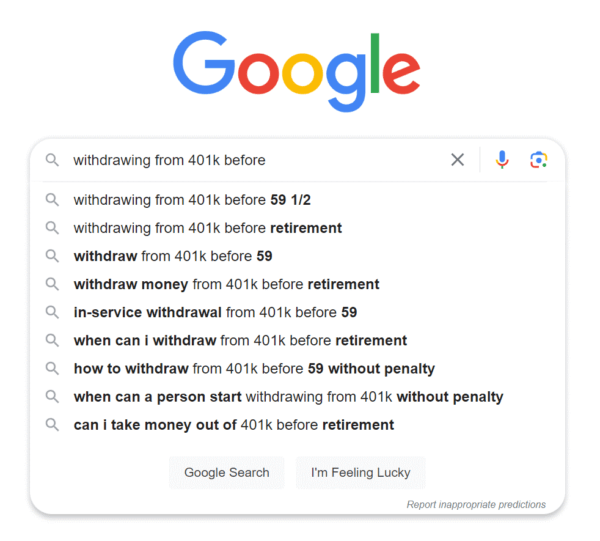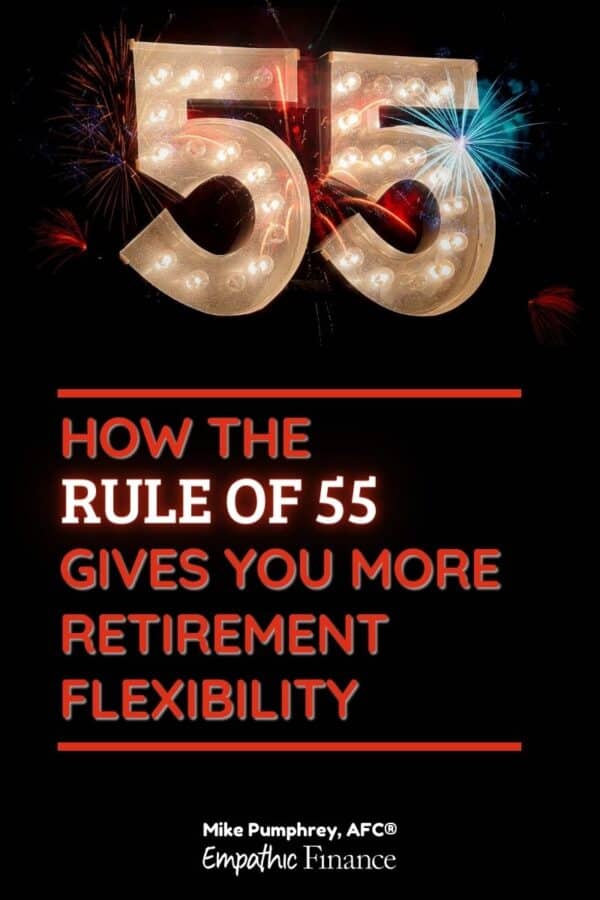The Rule of 55 allows you to take penalty-free retirement distributions, giving you increased flexibility even in adverse circumstances.
If you’ve done any research at all into how your 401(k) works, you know that you’re not supposed to withdraw any money from your account until you reach a certain age, 59 1/2, otherwise you will be charged a 10% penalty.

But actually, it’s not totally true. There are quite a few exceptions, including a provision for people who are not quite at retirement age yet.
And it also becomes relevant (and positive) for those suffering from ageism in the workplace.
I’m talking about The Rule of 55.
Table of Contents
What is The Rule of 55?
The Rule of 55 is an exception to the usual requirement of being age 59 1/2 before withdrawing from your workplace 401(k) to avoid penalties.
Here, you can withdraw money from your 401(k) penalty-free any time after age 55 if you lose your job.
And to be specific, this must be in the calendar year where you turn 55 (so technically you could have been 54).
The internet appears to be silent on when this provision came about, which leads me to believe that it’s not new. Nevertheless, I’m sure that many of you don’t now about it.
For some others, The Rule of 50
If you’re in public safety jobs, such as police officer, firefighter, EMT, etc., you can get this benefit five years earlier, on the calendar year that you turn age 50. So The Rule of 55 becomes The Rule of 50 for you.
Some caveats
There are some caveats here worth talking about:
- You can only withdraw money from the 401(k) you had at that particular company. So if you have other 401(k)s (which you haven’t yet rolled over), those are not eligible.
- This applies only to workplace plans like the 401(k) and the 403(b). IRAs, including money you’ve rolled over into an IRA from said 401(k), are not eligible.
Some unexpected benefits
It’s not all restrictions. In fact, there are two very significant leniencies here:
- You don’t have to have been let go of your job. You can leave your job voluntarily or not voluntarily, and you can still take penalty-free distributions
- You can even get another job! So this doesn’t have to be the end of your pre-retirement employment.
Both are these are fairly large benefits, and it means that so many more people can start their withdrawals earlier if they want.
Some thoughts on ageism and early retirement
Ageism in the workplace is real, and it’s a scary thing, especially in the current job market.
My LinkedIn feed is filled with people saying variations on, “I’ve got 20+ years of experience and have had not a single job interview since I got laid off nine months ago.” It’s heartbreaking, and a severe repudiation (if we needed one) about how “no one wants to work” was always a lie.
For those in the back-half of the career age groups, a job loss can feel much scarier than for younger folks, because there’s always the fear that this job might be their last.
This varies by sector and demographics, but in many areas, a company is less likely to hire a 55 year old than a 35 year old. Some of this comes down to economics (the 35 year old is likely to be cheaper), but some of it is also that a 55 year old is seen as less valuable.
This is self-defeating and needlessly cruel. Nevertheless, it exists. Which is why this Rule of 55 is such an unexpectedly nice consolation prize.
I’ve talked about how people who wish to retire early need a “bridge” fund, a money source that people can tap before they reach the age where they can withdraw from their 401(k)s and IRAs without penalty.
But with the Rule of 55, their 401(k) itself could become a “bridge” fund, no alternate money source necessary, and this for people who didn’t necessarily want to start tapping their retirement funds early.
It’s a small consolation for those who had their jobs cut out from under them, and without the ability to get back into to the job market in the way they were before.
This is yet another reason why the 401(k) is the most lucrative investment product for most people. If you have the opportunity to sign up, don’t pass it up. Your older self will thank you.



